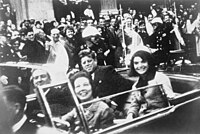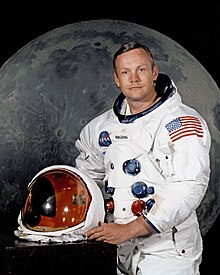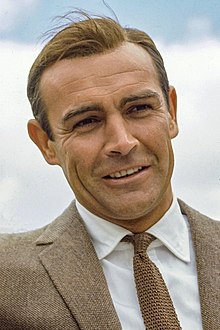Portal:1960s
The 1960s Portal
The 1960s became synonymous with the new, radical, and subversive events and trends of the period. In Africa the 1960s was a period of radical political change as 32 countries gained independence from their European colonial rulers. Some commentators have seen in this era a classical Jungian nightmare cycle, where a rigid culture, unable to contain the demands for greater individual freedom, broke free of the social constraints of the previous age through extreme deviation from the norm. Christopher Booker charts the rise, success, fall/nightmare and explosion in the London scene of the 1960s. However, this alone does not explain the mass nature of the phenomenon. Several nations such as the U.S., France, Germany and Britain turned to the left in the early and mid 1960s. In the United States, John F. Kennedy, a Keynesian and staunch anti-communist, pushed for social reforms. His assassination in 1963 was a stunning shock. Liberal reforms were finally passed under Lyndon B. Johnson including civil rights for African Americans and healthcare for the elderly and the poor. Despite his large-scale Great Society programs, Johnson was increasingly reviled by the New Left at home and abroad. The heavy-handed American role in the Vietnam War outraged student protestors across the globe, as they found peasant rebellion typified by Ho Chi Minh and Che Guevara more appealing. Italy formed its first left-of-center government in March 1962 with a coalition of Christian Democrats, Social Democrats, and moderate Republicans. Socialists joined the ruling block in December 1963. In Britain, the Labour Party gained power in 1964. In Brazil, João Goulart became president after Jânio Quadros resigned. This is a Featured article, which represents some of the best content on English Wikipedia..
The 1962 Tour de France was the 49th edition of the Tour de France, one of cycling's Grand Tours. The 4,274-kilometre (2,656 mi) race consisted of 22 stages, including two split stages, starting in Nancy on 24 June and finishing at the Parc des Princes in Paris on 15 July. There were four time trial stages and no rest days. After more than 30 years, the Tour was again contested by trade teams instead of national teams. Jacques Anquetil of the Saint-Raphaël–Helyett–Hutchinson team won the overall general classification, defending his title to win his third Tour de France. Jef Planckaert (Flandria–Faema–Clément) placed second, 4 min 59 s in arrears, and Raymond Poulidor (Mercier–BP–Hutchinson) was third, over ten minutes behind Anquetil. Anquetil's teammate Rudi Altig took the first general classification leader's yellow jersey after winning the first stage. He lost it the following day to André Darrigade of Gitane–Leroux–Dunlop–R. Geminiani, who won stage 2a, before regaining it after winning stage three. The lead was taken by Saint-Raphaël rider Albertus Geldermans after stage six. He held it for two stages, before Darrigade took it back for the next two. Flandria rider Willy Schroeders then led the race between the end of stage nine to the end of eleven, at which point Schroeders' teammate Rik Van Looy, a major pre-race favourite, abandoned the race with an injury. The following day, British rider Tom Simpson (Gitane–Leroux) became the first rider from outside mainland Europe in history to wear the yellow jersey. He lost it to Planckaert after stage thirteen's individual time trial to Superbagnères in the Pyrenees. He held the lead for seven stages, which included the Alps. Anquetil's victory in the individual time trial of stage twenty put him in the yellow jersey, which he held until the conclusion of the race. (Full article...)This is a Good article, an article that meets a core set of high editorial standards.
Madhouse on Castle Street is a British television play, broadcast by BBC Television on the evening of 13 January 1963, as part of the Sunday Night Play strand. It was written by Evan Jones and directed by Philip Saville. The production featured the young American folk music singer Bob Dylan, who soon became a major musical star. The play was made with electronic video cameras, although recorded onto film rather than tape. The only known copy of the play was junked in 1968, as was the standard practice of the time, despite the fact that Dylan and lead actor David Warner were by then famous. Although extensive searches have been made by the BBC, only partial audio recordings of four songs sung by Dylan survive. (Full article...)Selected picture - Crowds surrounding the Reflecting Pool, during the August 28 1963 March on Washington for Jobs and Freedom. An estimated 200,000 to 500,000 people participated in the march, which featured Martin Luther King Jr.'s famous "I Have a Dream" speech. It was a major factor leading to the passage of the Civil Rights Act of 1964 and the 1965 Voting Rights Act. The march was also condemned by the Nation of Islam and Malcolm X, who termed it the "farce on Washington".
Did you know -
Related portalsThis is a Featured article, which represents some of the best content on English Wikipedia..
Neil Alden Armstrong (August 5, 1930 – August 25, 2012) was an American astronaut and aeronautical engineer who in 1969 became the first person to walk on the Moon. He was also a naval aviator, test pilot, and university professor. Armstrong was born and raised in Wapakoneta, Ohio. He entered Purdue University, studying aeronautical engineering, with the U.S. Navy paying his tuition under the Holloway Plan. He became a midshipman in 1949 and a naval aviator the following year. He saw action in the Korean War, flying the Grumman F9F Panther from the aircraft carrier USS Essex. After the war, he completed his bachelor's degree at Purdue and became a test pilot at the National Advisory Committee for Aeronautics (NACA) High-Speed Flight Station at Edwards Air Force Base in California. He was the project pilot on Century Series fighters and flew the North American X-15 seven times. He was also a participant in the U.S. Air Force's Man in Space Soonest and X-20 Dyna-Soar human spaceflight programs. (Full article...)This is a Good article, an article that meets a core set of high editorial standards.
Edson Arantes do Nascimento (Brazilian Portuguese: [ˈɛdsõ aˈɾɐ̃tʃiz du nasiˈmẽtu]; 23 October 1940 – 29 December 2022), better known by his nickname Pelé (Portuguese pronunciation: [peˈlɛ]), was a Brazilian professional footballer who played as a forward. Widely regarded as one of the greatest players of all time, he was among the most successful and popular sports figures of the 20th century. In 1999, he was named Athlete of the Century by the International Olympic Committee and was included in the Time list of the 100 most important people of the 20th century. In 2000, Pelé was voted World Player of the Century by the International Federation of Football History & Statistics (IFFHS) and was one of the two joint winners of the FIFA Player of the Century. His 1,279 goals in 1,363 games, which includes friendlies, is recognised as a Guinness World Record. Pelé began playing for Santos at age 15 and the Brazil national team at 16. During his international career, he won three FIFA World Cups: 1958, 1962 and 1970, the only player to do so and the youngest player to win a World Cup (17). He was nicknamed O Rei (The King) following the 1958 tournament. With 77 goals in 92 games for Brazil, Pelé held the record as the national team's top goalscorer for over fifty years. At club level, he is Santos's all-time top goalscorer with 643 goals in 659 games. In a golden era for Santos, he led the club to the 1962 and 1963 Copa Libertadores, and to the 1962 and 1963 Intercontinental Cup. Credited with connecting the phrase "The Beautiful Game" with football, Pelé's "electrifying play and penchant for spectacular goals" made him a star around the world, and his teams toured internationally to take full advantage of his popularity. During his playing days, Pelé was for a period the best-paid athlete in the world. After retiring in 1977, Pelé was a worldwide ambassador for football and made many acting and commercial ventures. In 2010, he was named the honorary president of the New York Cosmos. (Full article...)Selected article -Sir Thomas Sean Connery (25 August 1930 – 31 October 2020) was a Scottish actor. He was the first actor to portray fictional British secret agent James Bond on film, starring in seven Bond films between 1962 and 1983. Connery originated the role in Dr. No (1962) and continued starring as Bond in the Eon Productions films From Russia with Love (1963), Goldfinger (1964), Thunderball (1965), You Only Live Twice (1967) and Diamonds Are Forever (1971). Connery made his final appearance in the franchise in Never Say Never Again (1983), a non-Eon-produced Bond film. He is also known for his notable collaborations with directors such as Alfred Hitchcock, Sidney Lumet and John Huston. Their films in which Connery appeared included Marnie (1964), The Hill (1965), The Offence (1973), Murder on the Orient Express (1974) and The Man Who Would Be King (1975). He also acted in Robin and Marian (1976), A Bridge Too Far (1977), Time Bandits (1981), Highlander (1986), The Name of the Rose (1986), The Untouchables (1987), Indiana Jones and the Last Crusade (1989), The Hunt for Red October (1990), Dragonheart (1996), The Rock (1996) and Finding Forrester (2000). His final on-screen role was as Allan Quatermain in The League of Extraordinary Gentlemen (2003). (Full article...)More Did you know (auto generated)
TopicsCategoriesWikiProjects
Associated WikimediaThe following Wikimedia Foundation sister projects provide more on this subject:
Discover Wikipedia using portals |






























